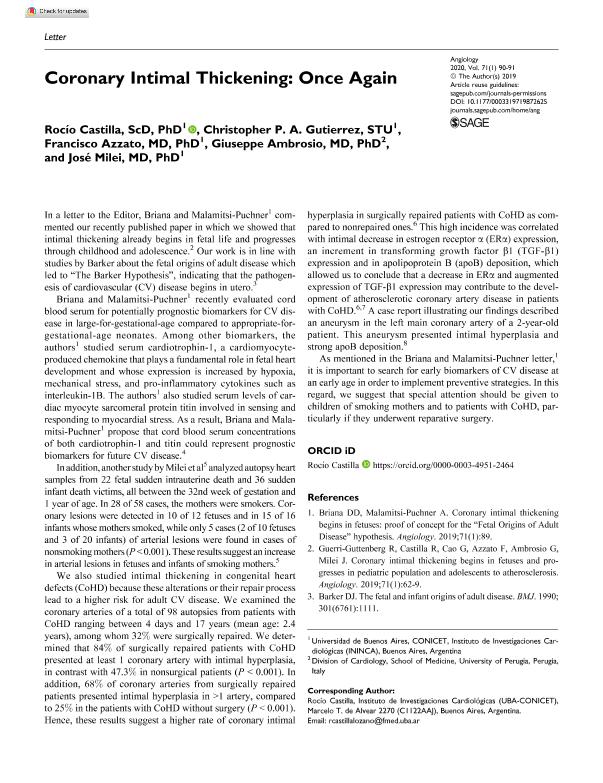Artículo
Coronary Intimal Thickening: Once Again
Castilla Lozano, Maria del Rocio ; Gutierrez, Christopher P. A.; Azzato, Francisco; Ambrosio, Giuseppe; Milei, Jose
; Gutierrez, Christopher P. A.; Azzato, Francisco; Ambrosio, Giuseppe; Milei, Jose
 ; Gutierrez, Christopher P. A.; Azzato, Francisco; Ambrosio, Giuseppe; Milei, Jose
; Gutierrez, Christopher P. A.; Azzato, Francisco; Ambrosio, Giuseppe; Milei, Jose
Fecha de publicación:
01/2019
Editorial:
SAGE Publications
Revista:
Angiology
ISSN:
0003-3197
Idioma:
Inglés
Tipo de recurso:
Artículo publicado
Clasificación temática:
Resumen
In a letter to the Editor, Briana and Malamitsi-Puchner1 commented our recently published paper in which we showed that intimal thickening already begins in fetal life and progresses through childhood and adolescence.2 Our work is in line with studies by Barker about the fetal origins of adult disease which led to The Barker Hypothesis, indicating that the pathogenesis of cardiovascular (CV) disease begins in utero.3Briana et al.1 recently evaluated cord blood serum for potentially prognostic biomarkers for CV disease in large-for-gestational-age compared with appropriate-for-gestational-age neonates. Among other biomarkers, the authors studied serum cardiotrophin-1, a cardiomyocyte-produced chemokine that plays a fundamental role in fetal heart development and whose expression is increased by hypoxia, mechanical stress and proinflammatory cytokines such as interleukin (IL) 1b. The authors1 also studied serum levels of cardiac myocytesarcomeral protein titin, involved in sensing and responding to myocardial stress. As a result, Briana et al.1 propose that cord blood serum concentrations of both cardiotrophin-1 and titin could represent prognostic biomarkers for future CV disease.4In addition, another study by Milei et al.5 analyzed autopsy heart samples from 22 fetal sudden intrauterine death and 36 sudden infant death victims, all between the 32nd week of gestation and 1year of age. In 28 out of 58 cases, the mothers were smokers. Coronary lesions were detected in 10 of 12 fetuses and in 15 of 16 infants whose mothers smoked, while only 5cases (2 of 10 fetuses and 3 of 20 infants) arterial lesions were found in cases of nonsmoking mothers (p < 0.001). These results suggest an increase in arterial lesions in fetuses and infants of smoking mothers.5We also studied intimal thickening in congenital heart defects (CoHD) because these alterations or their repair process lead to a higher risk for adult CV disease. We examined the coronary arteries of a total of 98 autopsies from CoHD patients ranging between 4 days and 17 years (mean age: 2.4 years), among whom 32% were surgically repaired. We determined that 84% of surgically repaired CoHD patients presented at least 1 coronary artery with intimal hyperplasia, in contrast with 47.3% in nonsurgical patients (p<0.001). In addition, 68% of coronary arteries from surgically repaired patients presented intimal hyperplasia in >1 artery, compared with 25% in the CoHD patients without surgery (p<0.001). Hence, these results suggest a higher rate of coronary intimal hyperplasia in surgically repaired CoHD patients as compared with non-repaired ones.6 This high incidence was correlated with intimal decrease in estrogen receptor α (ERα) expression, an increment in transforming growth factor β1 (TGF-β1) expression and in apolipoprotein B (apoB) deposition, which allowed us to conclude that a decrease in ERα and augmented expression of TGF-β1 expression may contribute to the development of atherosclerotic coronary artery disease in CoHD patients.6,7 A case report illustrating our findings described an aneurysm in the left main coronary artery of a 2-year-old patient. This aneurysm presented intimal hyperplasia and strong apoB deposition.8As mentioned in the Briana and Malamitsi-Puchner letter,1 it is important to search for early biomarkers of CV disease at an early age in order to implement preventive strategies. In this regard, we suggest that special attention should be given to children of smoking mothers and to CoHD patients, particularly if they underwent reparative surgery.
Palabras clave:
Intimal thickening
,
cardiotrophin-1
,
titin
Archivos asociados
Licencia
Identificadores
Colecciones
Articulos(ININCA)
Articulos de INST.DE INVEST.CARDIOLOGICAS (I)
Articulos de INST.DE INVEST.CARDIOLOGICAS (I)
Citación
Castilla Lozano, Maria del Rocio; Gutierrez, Christopher P. A.; Azzato, Francisco; Ambrosio, Giuseppe; Milei, Jose; Coronary Intimal Thickening: Once Again; SAGE Publications; Angiology; 71; 1; 1-2019; 90-91
Compartir
Altmétricas



